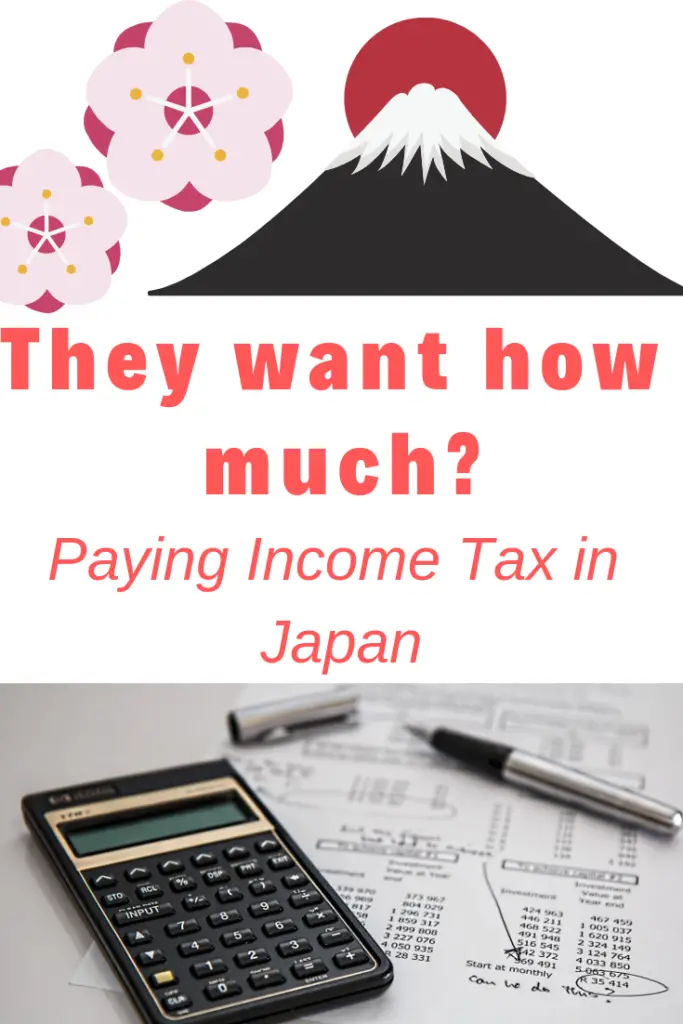Paying Tax in Japan – Income Taxes
Taxes, Insurance, and Pension Payments
When coming to live in Japan, taxes, health insurance, and pension payments can seem like one big intimidating mess. But it doesn’t have to be that way. In this post I attempt to demystify some of what’s expected when it comes to paying tax, health insurance, and Pension Payments in Japan, as well as give you some advice about what to watch out for.
Income Taxes
One of the first things you have to get your head around is how your income is taxed. Bear with me. It can be a little complex. Income Tax is paid by individuals at the National, prefectural, and municipal levels. The amount paid is calculated on the taxable income of the individual (some websites have used the term “net income” but I’m afraid that’s a bit misleading).
National Income Tax Rates
Taxable Income
less than 1.95 million yen
1.95 to 3.3 million yen
3.3 to 6.95 million yen
6.95 to 9 million yen
9 to 18 million yen
18 to 40 million yen
more than 40 million yen
Tax Rate
5% of taxable income
10% of taxable income minus 97,500 yen
20% of taxable income minus 427,500 yen
23% of taxable income minus 636,000 yen
33% of taxable income minus 1,536,000 yen
40% of taxable income minus 2,796,000 yen
45% of taxable income minus 4,796,000 yen
Note: Most starting English teachers in Japan probably fall into the two lowest tax brackets. The English conversation school I work at pays between 2.5 and 3 million yen as a starting salary. But your “Taxable Income” is a lot lower than your Gross Income. There is a calculation to work out your “Taxable income” that I’ll go over below.
Other Income Tax Rates
On top of National Income Tax you are required to pay Prefectural and Municipal Taxes.
Prefectural Income Tax is paid at a flat rate of 4% of taxable income.
Municipal Income Tax is paid at a flat rate of 6% of taxable income.

Ok so far…
So, it seems pretty straightforward so far. But, it gets more interesting when you realise that your employer only deducts the National Income Tax from your salary. Prefectural and Municipal Income tax is your own responsibility to pay. This was very different from what I was used to in New Zealand where the total amount of your income tax is taken out of your salary before you ever see it. It can certainly be quite dangerous if you’re not used to putting money aside every month to pay a tax bill at the end of the year.
Watch out!
There are a lot of misconceptions regarding the Japanese Tax System and why it appears to non-Japanese employees that they pay little tax in their first year in Japan, but a lot more in their subsequent years. We are told that in Japan we pay tax on the previous year’s earnings. A lot of people assume (myself included) that because we had no income in the previous year the tax rate is just really low. That’s not really the case. It appears that way because the National Income Tax and the Prefectural and Municipal Income taxes are paid so differently.
National Income Tax is deducted by your employer
Let’s look first at National Income Tax. We’ve already learnt that this is deducted from your salary by your employer. This money is paid to the tax office by your employer month by month. At the end of the year there is often a slight tax readjustment. This depends on what you’ve paid that year that might be deductible, like health insurance or pension. This is pretty relatable to what happens in New Zealand.
Prefectural and Municipal Income Tax is paid directly by the employee
When it comes to the Prefectural and Residential Income Taxes, you are (theoretically) paying them from the moment you start working in Japan. The thing that confuses people is that you don’t actually pay the tax bill until the following year. What happens is that after you pay your final amount of National Income Tax, at the end of the tax year, the National Tax Office shares your salary information with the Prefectural and City Tax Offices. That information is then collated and a tax bill is sent out to all employees based on your earnings. This might vary a bit between cities and prefectures, but here in Imabari, Ehime, the tax booklet is sent out in June with 11 repayments over the following year.
It’s not that your first year’s income is taxed less…
So, although it seems that during your first year of work in Japan you’re taxed a bit lighter, in reality you’re paying the full amount of tax. This illusion is caused because you’re paying your National Income Tax immediately (it’s deducted from your income), but you may not get your Prefectural and Municipal Tax bill until May or June the following year. Although it’s just an illusion that you’re paying less tax, you’re actually in a good position in comparison to other people working in Japan, who are all paying their taxes for previous year.
Case Study
Jimbob – works at an English conversation school (eikaiwa) for an annual salary of 2,986,000 yen.
From this figure we can take off the “Employment Income Deduction” in order to get the Taxable Income figure.
NB: In order to make this explanation as simple as possible I’ve left out other tax deductibles like health insurance and pension. I’ll write a specific post about them in the near future.
NB2: The calculation that follows does not give you your Employment Income Deduction. It gives you your actual Taxable Income figure. If you want your Employment Income Deduction amount, it is the difference between the two figures.
For Jimbob’s Total Earnings bracket the calculation is as follows:
Take the Total Earnings and divide by 4. Round the result down to the nearest 1000 yen. Then take that figure and multiply by 2.8. Then from that figure subtract 180,000. The result is your Taxable Income.
Taxable Income Calculation
The Calculation
Total Earnings / 4
Round down to nearest 1000
x 2.8
– 180,000
For Jimbob
2,986,000 / 4 = 746,500
Remember to round down to 746,000
746,000 x 2.8 = 2,088,800
2,088,800 – 180,000 = 1,908,800
So Jimbob’s Taxable Income is 1,908,800 yen.
You can see from the chart above that that puts him in the lowest tax bracket. Jimbob must pay 5% of his Taxable Income as National Income Tax. He will then have to pay a further 4% as Prefectural Income Tax, and another 6% as Municipal (City) Income Tax.



Hello:
For tax purposes, a first-year English teacher in Japan from US is resident or non-resident? It is said non-resident pays 20.14% flat tax and no deduction. That’s huge amount money for a low-income teacher.
Thank you!
Hi Tiffany,
Thanks for your comment.
I’ve just had a quick search and yes a first year teacher is a “non-resident for tax purposes” in Japan.
I found that on this page:
https://www.nta.go.jp/english/taxes/individual/12006.htm
According to Nomad Capitalist the rate is now 20.42. But when you’re doing your research make sure that you’re comparing apples with apples. You’re right that it is a high tax rate, but things like accommodation and grocery shopping are really cheap here. I don’t know about the U.S. but I’ve worked out that I’m paying about a quarter of the rent that I would be paying in New Zealand (but NZ is ridiculously expensive).
https://nomadcapitalist.com/finance/japan-non-resident-tax/#:~:text=the%20following%20year.-,Tax%20Rates%20in%20Japan%20for%20Non%2DResidents,includes%20the%202.1%25%20surtax%20rate.
Thanks again for your comment.
Nathan